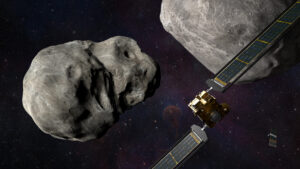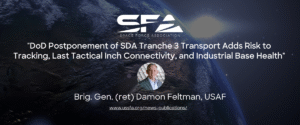By Colonel Christopher P. Mulder, USAF
The views and opinions expressed here are those of the author and do not necessarily reflect the official policy or position of any agency of the U.S. government or other organization.
NASA’s Double Asteroid Redirection Test (DART) recently collided with an asteroid in the name of planetary defense research. Developing a tool like DART may be critical to the future survival of life on earth, considering the suspected cause of the extinction of dinosaurs sixty-six million years ago was an asteroid strike. However, this is not the time for the United States to “go it alone.” To be successful in far-reaching endeavors and lofty space goals, the U.S. Space Force needs to leverage partnerships and look to the international community to build a global space security cooperation program.

Credits: ASI/NASA
DART was built and launched solely by the United States. While an asteroid hitting the United States would be catastrophic, it would also be an unlikely target, since the United States’ land mass only encompasses 1.87% of earth’s surface. Which raises the question—wouldn’t it be more beneficial to take a global approach when pursuing planetary defense? The European Space Agency (ESA) was slated to launch a planetary defense mission prior to DART, but cancelled their Asteroid Impact Mission due to funding constraints. ESA plans to launch a follow-up mission to DART in 2024, if funding does not prevent it once again.
The U.S. Space Force, alongside allies and partners, will create the environment for both private and public entities to unlock space resources that can then allocate those resources to planetary defense, sending humans to Mars, and unlocking other economic prosperity on earth. DART cost $325 million to plan, research, and execute, and it proved that an earth-based rocket could launch a spacecraft to impact an asteroid 6.8 million miles away. This accomplishment is quite phenomenal, so kudos to NASA for proving the impossible. However, a true planetary defense apparatus, among other space security cooperation efforts, will cost trillions of dollars. One single country cannot carry this burden alone. It will only be possible by tapping into global resources, global knowledge, and even global wisdom.
Traditional security cooperation activities within the national security and defense realm include exercises, information sharing, armaments cooperation, advising and assisting, and mutually beneficial training. These opportunities exist to build partner capacity and allow the leveraging of allies’ and partners’ strengths to achieve common goals. It is time to further expand security cooperation in space to build capabilities to combat existential threats such as Earth-bound asteroids. Such extreme and advanced aims require equally remarkable and unique solutions.
Even though there are long-standing space agreements already in place like the 1967 Outer Space Treaty, they are generally viewed as outdated due to the exponential growth in satellites and other space enabling technology that are rocketing toward unlocking untapped resources and opportunities in space—rare-Earth metals, space-based solar power, data (awareness, sharing, processing, fusion), alternative habitats (Moon and Mars), transportation and tourism, and national security and defense applications.
Existing paradigms may require a complete reset—new governance bodies, new cross-cutting resource bodies, new ways to incentivize companies, new legal structures that surround space related activity—to responsibly achieve what nations and companies are seeking, to unlock transformational results. The U.S. Space Force does not have the authority to change many of these paradigms, but what it lacks in authority, it overcomes with strong relationships, a technological focus, global access through U.S. Embassies, and industry partnerships.
There are 195 states in the world—193 are United Nation member states and two (Vatican City and Palestine) are considered non-member states. The U.S. Space Force is uniquely suited to carry the mantle forward on progressing true global space security cooperation efforts with many of the 195 states.

It is also notable that NASA spearheaded DART alone, and not via a joint endeavor with the U.S. Space Force or Space Command, especially when considering the national security and defense impacts of a threatening asteroid. Clearly defined roles and responsibilities will have to identify whether NASA, U.S. Space Force, U.S. Space Command, international space organizations, other nations, or some combination of these options, will ultimately be responsible for planetary defense.
The U.S. Space Force should explore pooling resources, technology, bold thinking, and initiative across the globe to drive transformational change in space security cooperation that will truly create a space environment where private and public entities can harness space’s true potential, send humans to Mars, and protect the planet from asteroids or bad actors.
To do this, space security cooperation will need prioritization. This will require extraordinarily strong leadership, substantial resources, and public involvement. The U.S. Space Force should aggressively grab the space security cooperation torch–there is just too much at stake to not lead the way on planetary defense, resource exploration, and missions to Mars.
About The Author
Colonel Christopher P. Mulder, USAF was the 2020-2021 Senior Air Force Fellow at the Atlantic Council where he engaged on space and other national security topics.
The views and opinions expressed here are those of the author and do not necessarily reflect the official policy or position of any agency of the U.S. government or other organization.










